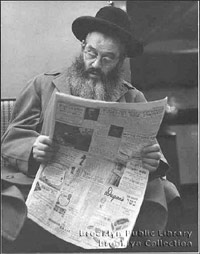The Second Newspaper Is an Idea Whose Time Has Come Again
 Back in the day, when we got our news via dead tree, most folks picked up a newspaper either at the newsstand (quaint idea!) or by subscription. For a long time, most big cities supported more than one newspaper and, hard as it is to believe, some still do. Prior to the 1960s, Boston and New York had at least six and frequently many more. Media choice, time and economics whittled that down to our current condition, where most cities have at best one paper.
Back in the day, when we got our news via dead tree, most folks picked up a newspaper either at the newsstand (quaint idea!) or by subscription. For a long time, most big cities supported more than one newspaper and, hard as it is to believe, some still do. Prior to the 1960s, Boston and New York had at least six and frequently many more. Media choice, time and economics whittled that down to our current condition, where most cities have at best one paper.
A few years ago, as the Boston Globe‘s front page described attempts at Mideast peace, but the Boston Herald told readers that a gorilla had escaped the zoo. For those of us near the zoo that day, news of the gorilla trumped any peace talks.
But I digress.
Meet The Christian Science Monitor
It’s good to have a second news source you can turn to. The classic – and still one of the best – second papers is The Christian Science Monitor. The Monitor’s excellent reporters are far less concerned with breaking news than they are with putting it in context and filling in all the details; giving the reader the full story. Their award winning journalism and global focus makes them a compliment to most local news sources.
That’s why the Monitor is great a second newspaper, it has a different take on stories than you see in other news sources. To be clear: It is not one of those shouting-heads news outlets that just puts a partisan spin on stories. The Monitor offers thoughtful, well-researched and nuanced stories. Sometimes it offers a very different take than you find on other news sources. Other times it takes a similar approach but with far more context. Either way, the articles almost always provide a deeper look that gives you much more to think about than you’d get from a headline or the AP version. (Not that there’s anything wrong with the AP, except for the whole digital thing.)
There are several other newspapers I turn to for this kind of information – and which everyone now has access to at the click of a link:
The Epoch Times
One is The Epoch Times, which covers the world but is especially strong on news about China. That’s because it started as a Chinese language news source by Chinese people who weren’t content with the party line of information. It offers original news and reporting from China on a level unmatched by anyone else. As China’s importance and efforts at censorship continuing to grow, so does the need for The Epoch Times.
There’s obviously a huge quality issue between the Monitor, which I gladly subscribe to, and the Epoch Times which is free and localized in its six national editions. Like the Monitor, the print edition is just a ton richer than the still interesting online edition. I’ve found some of the edgiest, earliest and most visionary reporting around it.
Their pages have parsed Wikileaks for four years now. More controversially, they’ve published a series of articles on organ harvesting in China’s labor camps. These accounts of forced surgery on dissidents to provide party faithful in China with organ transplants could be the biggest human rights story of the decade. It could also be bias in news. They’ve been early and right before – so I continue to pick them up as an unusual source of news that is distinctly not in the echo chamber of the conventional media.
GlobalPost
Another great second paper is GlobalPost. This web-based news source works with hundreds — if not thousands — of freelance reporters around the world, who live in the nations they cover. The best way to describe GlobalPost is to say that it is The Christian Science Monitor of wire services like the AP and Reuters. To give you an idea of the quality, consider that GlobalPost‘s stories are picked up by everyone from NPR to Bill O’Reilly, as well as AP and Reuters.
News coverage is being cut back everywhere in the US. There are fewer reporters in city halls, state houses and especially overseas than ever before. (Did you know CBS only has ONE foreign bureau? It’s in London. They are supposed to cover the entire WORLD.) Reading and supporting any or all of these organizations is a great way to make sure that when the Next Big Story hits, you are already well-informed.
—
Disclosure: Before joining Thomson Reuters, I spent several years as Digital Strategy Manger at The Christian Science Monitor. I pay for my own subscription, and am fully independent of them and the other publications mentioned here.

 The future of digital experiences will be built by strategists who grasp the full array of emerging business, social, and technical models. Specialties in user experience, branding, application design, and data science are laying the foundation for richer user experiences and business models breakthrough products and revenue based marketing.
The future of digital experiences will be built by strategists who grasp the full array of emerging business, social, and technical models. Specialties in user experience, branding, application design, and data science are laying the foundation for richer user experiences and business models breakthrough products and revenue based marketing.